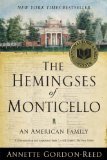Summary | Excerpt | Reviews | Readalikes | Genres & Themes | Author Bio

Critics' Opinion:
Readers' Opinion:
First Published:
Sep 2008, 800 pages
Paperback:
Sep 2009, 800 pages
What had gone before, the process that brought those two groups into their "Americanness,"
is largely the province of scholars of the seventeenth and early eighteenth
centuries. There are many reasons for this, but several immediately come to
mind. First, American slavery at its beginnings—obscure, distant, and tragic—is
probably for most people a less attractive point of focus than the story of the
discovery and political founding of the American nation. If you like your
history heroic—and many people seem to—the story of slavery in the early
American period is simply not the place to go looking for heroes, at least not
among the people most commonly written about.
Second, with the exception of periodic bouts of "founders chic," in which
the men credited with drawing up the blueprint for the United States are pitted
against one another—Hamilton was really better than Jefferson, Madison was
better than Adams, and Franklin was better than all of them—the colonial
and Revolutionary period in America has so far failed to capture the cultural
imagination the way the Civil War era has. There is no Gone with the Wind
for the seventeenth and eighteenth centuries, no literature wallowing in the
romance of defeat, no passionate attachments to divisive symbols that live on to
poison contemporary race relations and threaten the American future. The Civil
War is over, but the politics that fueled it and helped design its aftermath are
still very much with us, playing out in various racially charged and seemingly
intractable disputes about desegregation, affirmative action, even the continued
use in the public sphere of a Confederate battle flag that once flew against the
United States of America. The years running up to, during, and after the Civil
War mark the beginning of the America we know today—a modern country, powered by
the market and free labor, multiracial in its composition (if somewhat
uneasily), and at its most fundamental core, united.
It is not as if no heroism or romance were to be found in the colonial
period. Schoolchildren are told an uplifting story about English men and women
escaping religious persecution to build their own cities upon the hill in what
would become New England. Who could not identify with the urge to live one's
life in peace and freedom, and not admire people willing to cross an ocean to do
it? That some of the later immigrants to New England were Puritans, who almost
immediately went about the business of persecuting those who did not toe their
particular version of "the line," does not diminish the attractiveness of those
early aspirations. It was the idea that counts. We can (and do) without
embarrassment draw a direct line from the dreams of those Americans in the
making to our dreams today.
Elizabeth Hemings's Virginia, however, presents a real problem. It is hard to
associate the earliest Virginians who controlled society with any aspiration
loftier than that of making a killing. The colony was, after all, founded by the
Virginia Company. It was from the very beginning a moneymaking
enterprise, a place for men seeking their fortunes with limited reference to
spirituality, with no nod to sentimentality and, apparently, very few limits on
how the moneymaking could proceed. In one historian's words, the people who
settled the colony were all adventurers "in the fullest sense of the term," men
"seeking the main chance for [themselves] in that part of the new world which .
. . seemed to offer [them] the best chances." The term "adventurer" doesn't
really do justice to the men who helped usher in this world, for we must instead
think of what those high-stakes gambles actually entailed. Voracious land
grabbing and land speculation, aided and abetted by the manipulation of public
offices, made a relative handful of people wealthy.
Excerpted from The Hemingses of Monticello © Copyright 2008 by Annette Gordon-Reed. Reprinted with permission by W. W. Norton. All rights reserved.





The House on Biscayne Bay
by Chanel Cleeton
As death stalks a gothic mansion in Miami, the lives of two women intertwine as the past and present collide.

The Flower Sisters
by Michelle Collins Anderson
From the new Fannie Flagg of the Ozarks, a richly-woven story of family, forgiveness, and reinvention.

The Funeral Cryer by Wenyan Lu
Debut novelist Wenyan Lu brings us this witty yet profound story about one woman's midlife reawakening in contemporary rural China.
Your guide toexceptional books
BookBrowse seeks out and recommends the best in contemporary fiction and nonfiction—books that not only engage and entertain but also deepen our understanding of ourselves and the world around us.